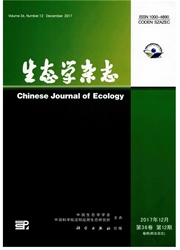

 中文摘要:
中文摘要:
利用2间玻璃室内夜间不同的温度条件,研究了水稻生长期间夜温升高对双季早、晚稻物质生产和养分积累的影响。结果表明:播种-幼穗分化期夜温升高增加早稻的干物质积累,而减少晚稻的干物质积累;幼穗分化期-抽穗的夜温升高对早、晚稻的干物质积累均有一定的负作用;抽穗后的夜温升高对早稻物质生产影响较小,但降低其茎鞘物质的转运,而晚稻的干物质生产和茎鞘物质的转运均提高。在早稻幼穗分化前夜温适度升高有利于提高根系活力,促进植株养分的积累,但不利于晚稻植株养分的积累;幼穗分化-抽穗期间的夜温升高均不利于早、晚稻植株的养分积累;灌浆结实期的夜温升高会造成早稻根系早衰,不利于养分吸收,但有利于保持晚稻根系较高活力,促进养分吸收。试验证明,不同生育阶段的夜温升高对双季水稻不同生育阶段的干物质生产和养分吸收的影响是不同的。
 英文摘要:
英文摘要:
Different nighttime temperature was established in two glasshouses to study the effects of nighttime temperature increase(NTI)at different growth stages on the dry matter production and nutrient absorption of double-cropping rice.The NTI from seeding to panicle differentiation promoted the dry matter production of early rice but suppressed that of late rice,whereas the NTI from panicle differentiation to heading exerted definite negative effects on the dry matter accumulation of both early and late rice.Post-heading NTI had less effects on the dry matter production of early rice,but slowed down the translocation of assimilates in early rice stem and sheath.On the contrary,post-heading NTI increased the dry matter production of late rice,and promoted the translocation of assimilates in late rice stem and sheath.The NTI before panicle differentiation improved the root activity and nutrient accumulation of early rice but did the opposite to late rice,and the NTI from panicle differentiation to heading was not favorable to the nutrient accumulation of both early and late rice.The NTI at filling-ripening stage induced the root aging of early rice,but promoted the root activity of late rice.This study proved that the NTI at different growth stages of double-cropping rice had different effects on the dry matter production and nutrient absorption of early and late rice.
 同期刊论文项目
同期刊论文项目
 同项目期刊论文
同项目期刊论文
 期刊信息
期刊信息
